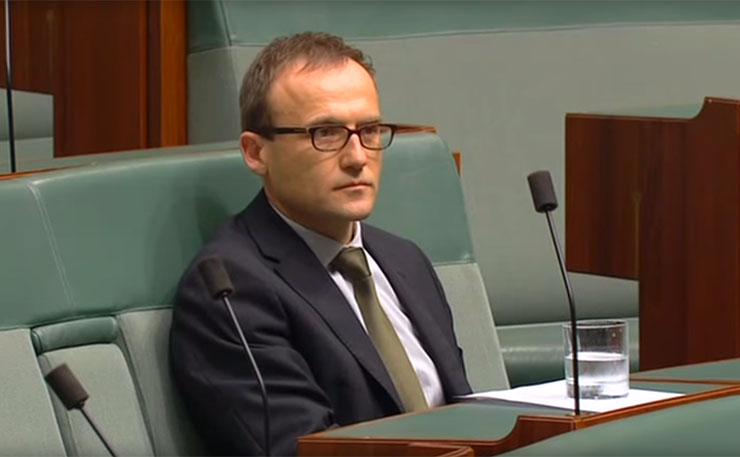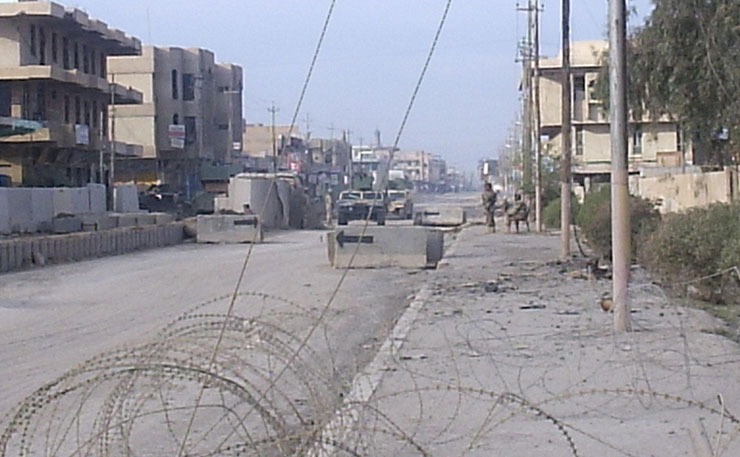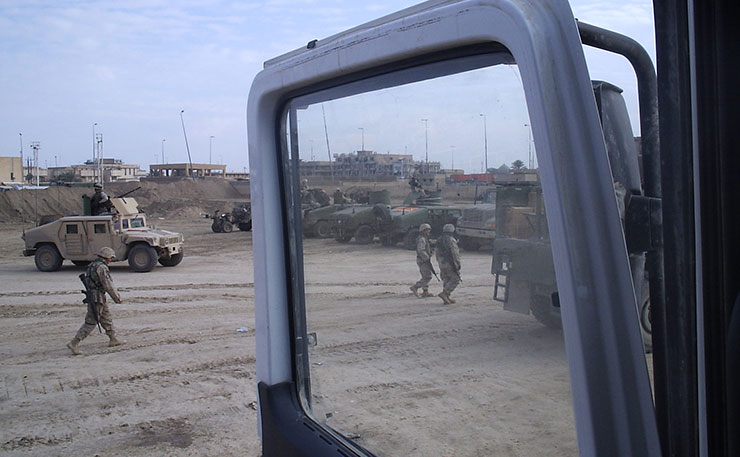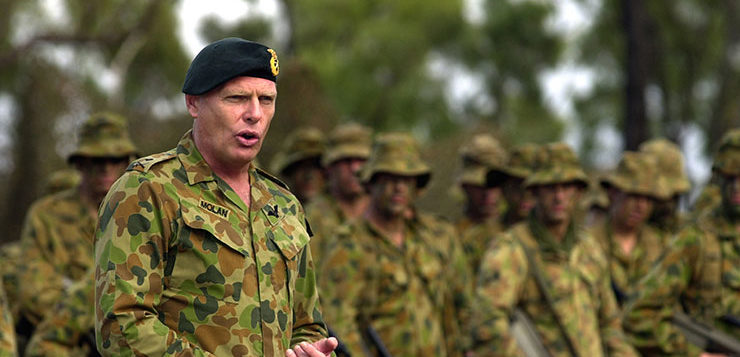A federal parliamentarian faces serious accusations over his time commanding Coalition forces in Iraq. Sue Wareham weighs in.
The “rule of law” is a concept beloved of our foreign affairs and defence ministers. Recent events in parliament however suggest that enthusiasm for it wanes when it is an Australian, especially a member of the governing party, who is accused of violating it.
In the wake of revelations that the new Senator Jim Molan, formerly Major General Molan, shared inflammatory videos last year, the Greens leader Richard Di Natale drew attention in parliament to Molan’s time as commander of the coalition assault on Fallujah in Iraq in November 2004, and to a UN special rapporteur who had said that coalition forces were using hunger and deprivation of water as a weapon against civilians.
Such actions violate international law. Greens MP Adam Bandt, outside of parliament, stated that “if there were … an independent inquiry into the war in Iraq in Australia … Jim Molan would probably be up for prosecution”.
The response of Molan’s supporters in parliament was to ignore the substance of the UN official’s remarks and to attack Di Natale for repeating them. Defence Minister Payne stated, “That reflection on the service of a senior Australian Army officer takes your lows to depths that I did not think you could plunge.”
Presumably the UN official who made the reported remark is similarly condemned by our minister.

The implicit assumption was that the very serious allegations could not be true because the accused had belonged to the ADF. This is as logical as stating that another of our hallowed institutions, the church, could never give rise to people who abuse positions of power.
Further, when Molan appeared on 7.30, he stated that Bandt had “smeared a vast range of men and women in uniform and not just them but their families as well”. Seeming to seek safety in numbers, Molan attempted to include tens of thousands of other ADF members – and even, in the finest Gilbert and Sullivan tradition, their sisters and their cousins and their aunts – in the accusations that had been made against him alone.
The sense of outrage that an Australian military commander’s record could be questioned was set at record high levels, perhaps commensurate with the need to kill off the allegations before too many people got interested in the reasons for them.
Kill them off they did. Within 24 hours, allegations of grave violations of the laws of war by an Australian who now sits in our Senate were no longer news. No probing questions about what led to the accusations, or the available evidence, or whether an inquiry is needed. Just the ridiculous notion that raising questions about one man’s record somehow impugns tens of thousands of other people and their loved ones.
It might not be of any interest to the likes of Defence Minister Payne, but reports of what did happen at Fallujah in November 2004 were plentiful at the time.

The first reports of actions that breach international humanitarian law came very soon after the coalition assault began. The Nation Magazine referred to “reports that US armed forces killed scores of patients in an attack on a Fallujah health center and have deprived civilians of medical care, food and water.” The New York Times also revealed that the city’s main hospital had been attacked.
The BBC stated on 11 November: “Without water and electricity, we feel completely cut off from everyone else… there is no medical help left in the city whatsoever.”
On 14 November, The Guardian reported: “The horrific conditions for those who remained in the city have begun to emerge in the last 24 hours as it became clear that US military claims of ‘precision’ targeting of insurgent positions were false… The city had been without power or water for days.”
A further allegation, supported by BBC pictures, is that coalition forces prevented the distribution of aid supplies to civilians.
The Washington Post, The Guardian and The Independent reported on the use of white phosphorus as a chemical weapon against the enemy in Fallujah. (The Chemical Weapons Convention allows it to be used as a smokescreen, but not in an offensive manner against people).
If all these reports are wrong and no war crimes were committed, an appropriate response from Molan would be to welcome an independent inquiry so that he can set the record straight. On the contrary however, he has issued threats of defamation against those who raise them.

In Molan’s first speech to parliament, he stated that “Some single-issue polemicists wanted to take me to the International Criminal Court years ago as a supposed war criminal because I fought in Iraq”.
Really? That was it? A referral to the ICC simply because he, along with hundreds of thousands of others, fought in Iraq? One has a sneaking feeling that there might have been more to it than that for these polemicists and their pesky concern with the laws of war.
Molan’s critics have raised very serious and credible concerns which were documented long before he entered parliament. Unless the ADF are now above the law, the allegations demand investigation rather than the silencing of those raising them.
In addition, as we approach the 15th anniversary of the illegal invasion of Iraq on 20 March 2003 – which was followed by a similar pattern of dubious military actions in Syria involving Australian forces – it is long since time we examined the decision-making process that led us into such a disaster. In the UK, a lengthy and very valuable report (the Chilcot Report) has been produced. Australia should follow suit.
As civilians suffer appalling harm in East Ghouta in Syria and elsewhere in the Middle East, there is a desperate need for international humanitarian law to be upheld. Australia is in no position to preach on this if we ignore credible reports of severe civilian harm in Fallujah when an Australia was in charge. If “the rule of law” means anything at all, it must be applied to all combatant forces.
The Australian government can, and almost certainly will, continue for as long as possible to ignore the allegations made against one of its own members, as it steadfastly continues to ignore calls for an Iraq War Inquiry. Grave concerns at past errors and alleged violations of the law do not go away however, but continue to cast doubt on our real commitment to the rule of law.
Dr Sue Wareham OAM is a former Canberra GP and a long-term peace activist. She has been a candidate for The Greens but this article is written in a personal capacity.
Donate To New Matilda
New Matilda is a small, independent media outlet. We survive through reader contributions, and never losing a lawsuit. If you got something from this article, giving something back helps us to continue speaking truth to power. Every little bit counts.




